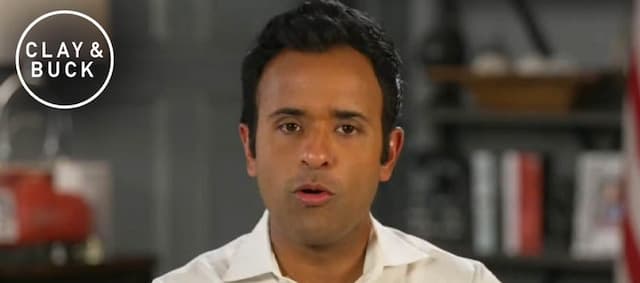Buck Thinks Through the Ramifications of Pelosi’s Taiwan Trip
BUCK: This Pelosi visit to Taiwan is apparently happening. We’re told this is gonna go down in the next couple days. It’s causing a lot of consternation among — well, depends on who you ask. The Chinese Communist Party is making really aggressive statements about this from Chinese state-affiliated media. They have one person put this out from a Chinese Communist Partby media platform, Global Times. They put out that Pelosi’s in Singapore and will fly to South Korea en route to Taiwan after visiting Malaysia. The PLA has clearly been well prepared.
If she dares to stop in Taiwan, it will be the moment to ignite the powder keg of a situation in the Taiwan Strait. So, there’s also this video of missiles being fired by Chinese and a lot of saber-rattling — I mean, a lot of “She better not or else” — and now everyone wondering what that “or else” actually means. And I’ve gotta tell you, I’m of two minds on this thing. On the one hand, you can’t bow down to the Chinese Communist Party more than we already do as a government and — let’s be honest — as a country on a regular basis.
We need all that cheap stuff imported into this country, need to be able to buy whatever it is on Amazon and have it right delivered to you, don’t want to make it here, have it made overseas. So, we’ve excused a lot of behavior until Trump came along. He doesn’t get nearly enough credit for this, and it was great to see the man himself, number 45, on Friday. Nice, long chat with him on air and off air. He was right about how China has been taking advantage of the United States.
He was right about the need for the U.S. to stand up to Chinese policies on trade and just the way that they always do what’s in their interests and they always do things that harm our interests while our own elites say, “Well, this is the way it has to be.” No, it doesn’t, actually. It doesn’t have to be that way. And things now I believe are at a different place than they were before the Trump presidency. So, on the one hand, yeah, Pelosi can’t bend the knee. That looks bad. But, on the other hand, what are we really willing to risk over Taiwan? Ask yourself this question. You know, I was listening over the weekend.
 There’s this great new podcast on the scene, Shawn Ryan, who’s a former Navy SEAL, and he’s had some great guests — D. J. Shipley and Erik Prince. I’ve listened to some of these podcasts that he’s done, long form. And the Erik Prince one is really interesting because it takes you into just how in so many ways incompetent and insidious the consensus, the machinery, particularly on foreign policy, but the moment that you talk about foreign policy mixed in with domestic politics, what is so often the consensus, everybody knows, everybody believes, they say. Well, why?
There’s this great new podcast on the scene, Shawn Ryan, who’s a former Navy SEAL, and he’s had some great guests — D. J. Shipley and Erik Prince. I’ve listened to some of these podcasts that he’s done, long form. And the Erik Prince one is really interesting because it takes you into just how in so many ways incompetent and insidious the consensus, the machinery, particularly on foreign policy, but the moment that you talk about foreign policy mixed in with domestic politics, what is so often the consensus, everybody knows, everybody believes, they say. Well, why?
Is that really true? Keep in mind, we have a signed agreement as a country that we would defend — we would defend the territorial integrity of Ukraine. And then when Ukraine was invaded by Russia, I think sanity prevailed because we said, “Well, hold on. We’re not actually gonna go to war with Russia over Ukraine.” Now, I understand that for defense of free peoples and our sense of democracy and decency and humanitarianism and all the rest of it, Taiwan is a country that is an ally; Taiwan matters in that sense to the United States.
But at some point, we actually have to look at the question: Would we be willing to risk and even engage in a war with China over this island? Not American soil. It’s not American citizens there. Would we — would you — want to actually go and send your own children to go fight? I mean, as adults, obviously. But would you want people from your family to go and fight in the Taiwan Strait over this? I think it’s interesting that people get so uncomfortable when you ask that question. Why? Isn’t that the critical question?
Shouldn’t we all be very clear on this? As I was saying in that long form with Erik Prince, the founder of Blackwater, the most fascinating thing to me other than a lot of the managerial excellence and general concepts that are applicable to life, but what was really interesting was just how incompetent the — and also self-dealing and willing to cover its own butt the federal government is. And I experienced some of that even myself. I saw it. I wasn’t involved at the top levels, but I saw it happening when I was in the CIA, that the federal government is always, first and foremost, concerned about the bureaucracy.
And the foreign policy establishment, the State Department, the think tanks, they put out these papers, and it makes people feel good to talk about democracy and the defense of our allies abroad and all of this. We spent 20 years in Afghanistan. For what? For what? Now, the initial invasion was not only the right idea, it was a necessary idea. But then the expansion into nation building just happened and one of the reasons it happened is because anybody who asked the question what are we doing here, what are we really trying to accomplish here was shouted down.
I think that it is time to have a really serious discussion over what lengths are we willing to go to because China right now is pushing in a way that we haven’t seen in a long time, making the kind of statement that could lead to miscalculation, saying things that do make us think that there’s the possibility here of a true provocation, perhaps even an act of war. Now, I don’t think they’re going to do anything against Speaker Pelosi. I hope they don’t do anything against Speaker Pelosi. But regardless of this specific trip…
 Let’s just all assume for our purposes and certainly hope that it goes along without any major incident. But what are we willing to do in response to a Chinese effort to take Taiwan? Are we actually going to have a military response? Do we want to go to war with China over this island? I think there are a lot of people that don’t like that question and then you ask them, “Okay. So, the answer is yes? Full-scale war with China over Taiwan?” We’re not treaty bound. We have a strategic ambiguity policy. Think about that.
Let’s just all assume for our purposes and certainly hope that it goes along without any major incident. But what are we willing to do in response to a Chinese effort to take Taiwan? Are we actually going to have a military response? Do we want to go to war with China over this island? I think there are a lot of people that don’t like that question and then you ask them, “Okay. So, the answer is yes? Full-scale war with China over Taiwan?” We’re not treaty bound. We have a strategic ambiguity policy. Think about that.
We’re supposed to all know the answer to this question, but the basis of the question is in, we don’t really know specifically what we’re supposed to do or what we would do. And that’s meant to off-balance the Chinese Communist Party; and perhaps you could argue that’s worked for a long time. But a war with China, is that something we would really be prepared to do? And I don’t pretend to have an easy answer, either. But I’ve just noticed this habit of people pretending, especially in the early phases, well, we all know what the answer is. Really? We all knew what the answer was with Iraq.
We all knew what the answer was with Afghanistan, with Libya, with the Syrians civil war, with the war in Ukraine. It’s all so clear, right? There are these people that say, “Oh, I’m the expert,” if there’s one thing you could take away from the covid phenomenon, it’s that just because somebody has credentials, just because they’re part of the managerial elite in some sector of public life, it does not mean that they are infallible and in fact it doesn’t even mean that they are smarter than you or know more than you on the subject matter that they are allegedly experts in.
They have a more specific knowledge in some ways, but their judgment, which, when you’re talking about policy, it’s fundamentally what matters. What big decisions do you make? When it final comes down to it, when you have that phone call, you know, “Mr. President” or “Mr. or Mrs. Secretary” — Mrs. — secretary of state, you know, whatever, head of the CIA, head of the, you know, chairman of the Joint Chiefs of Staff, you’re gonna advise the commander-in-chief, what do you tell that person when it really matters? That’s what it all comes down to. That’s why…
You know, I’m sure that the Faucis and the Birxes of the world can cite obscure studies and data to prove their bona fides on the issue. But when it came to making the big calls, they were wrong. When it comes to making a big call over Taiwan, we better get it write. That’s my biggest takeaway for you right now is that you’ll notice that no one really seems to have thought this through beyond the “we will defend democracy.” What does that mean? Somebody asked me. They said, “Okay. Do you want to station yourself…? Do you want to go?”
 Obviously, I’d need training and all that but just as an intellectual exercise be you want to go station yourself on an aircraft carrier off the coast of Taiwan ready in case of war? I would not want that job, actually, just in terms of whether I think that’s the proper policy to pursue in case of open hostilities. Would I, as an individual, feel good about risking my life for the independence of the island nation of Taiwan? And then I think we could also ask the next question. Well, if I wouldn’t feel — when I say feel “good about it.”
Obviously, I’d need training and all that but just as an intellectual exercise be you want to go station yourself on an aircraft carrier off the coast of Taiwan ready in case of war? I would not want that job, actually, just in terms of whether I think that’s the proper policy to pursue in case of open hostilities. Would I, as an individual, feel good about risking my life for the independence of the island nation of Taiwan? And then I think we could also ask the next question. Well, if I wouldn’t feel — when I say feel “good about it.”
If I wouldn’t feel like it is necessary, right? We’re talking about these questions. Would I want someone else; would I push for someone else to do that in my place? I think it’s some level of return to first principles of our national security would be really helpful here. We’ve gotten used to the apparatus just deploying troops and sending people on one tour after another and they’re carrying the load and they’re professionals, and this is what they do. All right. But are we giving them the right mission set?
Do we as the American people actually want this or is this just where inertia and the bureaucracy take us? Afghanistan can be a lesson, I think, in many ways for our future. And as we see what’s going on in Ukraine, well, we’re effectively now committed to supplying a war that seems like it will stretch on for years, and to what end exactly? What is the end state we’re looking for? You notice the White House doesn’t even talk about it. Do you think a war with China would be quick and easy and forgotten thereafter? What would we really be committing ourselves to?
What are the alternatives here? I don’t think these are easy questions, by the way. I don’t pretend that they’re easy. But I think that the people in charge just want everyone else to be quiet so they can pretend they are easy. And that is dangerous. And in this moment when the Speaker of the House is a matter of 24, 48 hours away from possibly the most tense moment we’ve seen with China in many years, I do think it’s important we think about what we would really like to do as a country here, what we are committed to do. We got a lot of problems here at home to fix, a lot of our own issues to tackle.
BREAK TRANSCRIPT
BUCK: Welcome back to Clay and Buck. This is Buck.
“There is no reason for the Chinese rhetoric. There’s no reason for any actions to be taken … It is very much in keeping with our policy.”
— NSC’s John Kirby on Pelosi’s trip to Asia, where she’s expected to visit Taiwan (Chinese officials said China will “not sit idly by”) pic.twitter.com/r8Lly4kNtH
— The Recount (@therecount) August 1, 2022
I also just want to take a quick moment to note that Nancy Pelosi is not some great freedom fighter. I am well aware of the fact that Pelosi was just — had her husband buying a whole bunch of chip makers in advance of the CHIPS Bill passing Congress, billions and billions of dollars in subsidies. Taiwan is one of the most important manufacturers of — I think the most important manufacturer of semiconductors in the world, of chips. And Pelosi’s always playing an angle for team Pelosi.
So, well aware of that. I don’t want you to think… It’s not like Nancy Pelosi all of a sudden is channeling George Washington. “Country first above all else.” No way. So, why is Pelosi going there? I’m sure she got herself beyond what she anticipated with this one, probably wanted to talk to some of those chip makers, make sure that those investments are sound, maybe get a little bit of good information going forward.
But she stumbled into it, and she’s our Speaker of the House, no matter what we think about that; so, this is where we are now. We got any current or former military want to weigh in on the Taiwan situation, 800-282-2882. Love to hear from you. What do you think about this? And, I mean, honestly, should we go to the mat to defend Taiwan if it comes to that?





